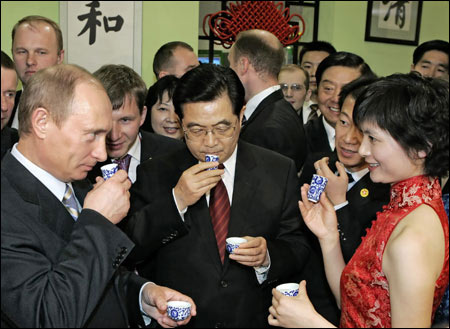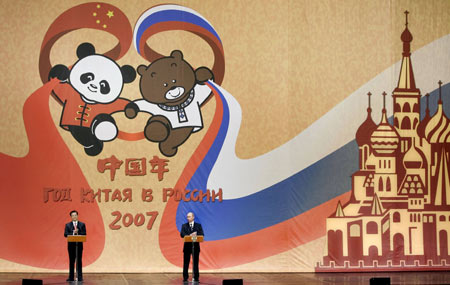Russia's Putin vows close China ties under Medvedev

March, 2008
Russian president Vladimir Putin promised China on Thursday that Moscow would maintain its strong ties with Beijing under his successor, Dmitry Medvedev. Putin, who rules the world's second-biggest oil exporter, says relations with China are at an historic high while Chinese leader Hu Jintao describes Putin as his "good friend". "Putin and Hu Jintao exchanged sincere wishes of success in future work for the stable development of the two countries in the period after the election of the new Russian president," the Kremlin press office said in a statement. "Putin underlined that the course of comprehensive development of Russian-Chinese strategic cooperation will be continued in the future," the Kremlin said.
The two leaders meet regularly and Hu was one of the first world leaders to congratulate Medvedev after his March 2 election as Russia's next president. Medvedev, who will be sworn in as president in May, told visiting German Chancellor Angela Merkel on Saturday that he would seek continuity in Russian foreign policy. Russia is eager to boost exports of oil, gas and nuclear products to China, the world's second biggest consumer of oil and power, though China's growing world clout is watched with some anxiety by Moscow's elite. China, set to overtake Germany as the world's third biggest economy, is Russia's number two trading partner after the European Union with $35 billion in 2007 bilateral trade. China's state-owned Sinopec Group has a multi-billion dollar investment with Russia's biggest oil producer, Rosneft. They jointly run Siberia's UdmurtNeft oil producer and share the Sakhalin-3 Veninsk exploration block off Russia's Pacific coast.
Russia, whose $1.3 trillion economy is booming for a tenth straight year, has forged close ties with China on a number of world issues, including Iran and North Korea. But relations over the past century between Moscow and Beijing have run hot and cold. China and the Soviet Union went from being best friends in the 1950s to suspicious rivals a decade later when they fought a series of border skirmishes after falling out over ideological principles. In 2007, Putin and Hu presided over their two countries' biggest joint military exercises as part of Shanghai Cooperation Organisation (SCO), a regional grouping of growing importance that includes Russia, China and Central Asian states.
Source: http://uk.reuters.com/article/oilRpt...84078120080313
In related news:
CHINA AND RUSSIA: THE GENDARMES OF EURASIA

Russia has been the most prominent supporter of China’s actions in Tibet. On March 17, Moscow applauded China’s determined effort to suppress “unlawful actions” in the autonomous region. The next day, in an article published in Rossiiskaya Gazeta, Foreign Minister Sergei Lavrov claimed that the unrest in Tibet was linked to Kosovo’s declaration of independence. [For background see the Eurasia Insight archive]. “There are grounds to believe that all this happens not by chance," Lavrov said. “The situation in Kosovo is the most vivid example of ethnic separatism," Lavrov continued. “Developments in other parts of the world also make it possible to suppose that we are witnessing only the beginning of an utterly explosive process." Russia’s strong show of support for China suggests that the two states might intervene in the event that anti-government protests broke out in one of the SCO member states in Central Asia. The possibility of such unrest in the region is not so far-fetched.
The state of Uzbekistan’s economy has some observers believing that Tashkent remains a potential site of unrest, despite the appearance of Islam Karimov’s regime being in complete control. Kyrgyzstan, or course, has been a hotbed of instability since the 2005 ouster of former president Askar Akayev. And Tajikistan, where the economic infrastructure came crashing down during the harshest winter in a generation, also can be counted as a potential candidate for anti-government protests. There is good reason to believe that if unrest breaks out in Central Asia -- whether it is connected to a rigged election, an unexpected succession or the implosion of the economy -- the Chinese crackdown in Tibet can provide a repression blueprint. China and Russia have already used the SCO to prepare for several possible contingencies. The SCO’s Peace Mission military exercises in 2007, for example, dealt with a possible militant uprising, as well as with a refugee scenario. Thus, specific response plans for several different Central Asian scenarios would seem to exist. Russia, naturally, is best positioned to lead a potential intervention in Central Asia. Under the auspices of the Collective Security Treaty Organization, Russia maintains bases in Kyrgyzstan and Tajikistan. It also has the ability to quickly deploy troops to Uzbekistan under terms of a 2006 bilateral agreement.
It is possible to view the SCO, given its dedication to propping up the authoritarian order in Central Asia, as a present-day analogue to the Holy Alliance -- the 19th century entente in which Russia, Austria and Prussia dedicated themselves to the maintaining Europe’s then autocratic order. As the Tibetan example suggests, China and Russia, whether in Tibet or potentially in Central Asia, have eagerly embraced the role of gendarme of Eurasia.
Source: http://www.eurasianet.org/department...v032008a.shtml
China trade to Russia through Manzhouli port up 27% in 2007

Trade to Russia through Manzhouli, China's largest land port in the northern Inner Mongolia Autonomous Region, topped 8.43 billion U.S. dollars in 2007, up 27percent from the previous year. Imports from Russia through the port totaled 7.44 billion U.S dollars, up 21.4 percent from the previous year. Exports to Russia increased 96 percent to 990 million U.S. dollars in 2007, according to Manzhouli customs on Thursday. Crude oil imports contributed to the trade boom. China imported more than nine million tons of crude worth 4.55 billion U.S. dollars via Manzhouli customs in 2007. It accounted for more than half of the total trade revenue. The imports mainly consisted of wood, crude oil and chemical products, while exports were mainly mechanical and electrical products, vegetables, fruits and textiles.
Source: http://news.xinhuanet.com/english/20...nt_7828900.htm
Iran Willing to Become Full Member of SCO

Iran has applied to the Secretariat of Shanghai Cooperation Organization (SCO) to become its full member, RIA Novosti reported. Iran's Foreign Minister Manouchehr Mottaki declared his country’s intention to change the observer’s status at SCO to the status of permanent member after he met with President of Tadjikistan Emomali Rakhmonov in Dushanbe. Tadjikistan backs up this intention of Iran, the official specified. Tadjikistan has been the SCO member since the time of its establishment and presides in this organization in 2008. Mottaki said his country proceeds with cooperating with IAEA but develops its own nuclear program at the same time. Manouchehr Mottaki and Afghanistan’s Foreign Minister Rangin Dadfar Spanta are in Dushanbe now, deliberating with Tadjikistan’s authorities on issues of three-party cooperation, including setting up a common TV Channel that will broadcast in the Persian language and building a railway road from Tadjikistan to Iran via Afghanistan. The visits of Afghanistan’s and Iran’s foreign ministers to Tadjikistan set the stage for the meeting of presidents of those countries.
Source: http://www.kommersant.com/p-12231/Iran_SCO/
No comments:
Post a Comment
Dear reader,
New blog commentaries will henceforth be posted on an irregular basis. The comment board however will continue to be moderated on a regular basis. You are therefore welcome to post your comments and ideas.
I have come to see the Russian nation as the last front on earth against the scourges of Westernization, Americanization, Globalism, Zionism, Islamic extremism and pan-Turkism. I have also come to see Russia as the last hope humanity has for the preservation of classical western/European civilization, ethnic cultures, Apostolic Christianity and the concept of traditional nation-state. Needless to say, an alliance with Russia is Armenia's only hope for survival in a dangerous place like the south Caucasus. These sobering realizations compelled me to create this blog in 2010. This blog quickly became one of the very few voices in the vastness of Cyberia that dared to preach about the dangers of Globalism and the Anglo-American-Jewish alliance, and the only voice emphasizing the crucial importance of Armenia's close ties to the Russian nation. Today, no man and no political party is capable of driving a wedge between Armenia and Russia. Anglo-American-Jewish and Turkish agenda in Armenia will not succeed. I feel satisfied knowing that at least on a subatomic level I have had a hand in this outcome.
To limit clutter in the comments section, I kindly ask all participants of this blog to please keep comments coherent and strictly relevant to the featured topic of discussion. Moreover, please realize that when there are several "anonymous" visitors posting comments simultaneously, it becomes very confusing (not to mention annoying) trying to figure out who is who and who said what. Therefore, if you are here to engage in conversation, make an observation, express an idea or simply insult me, I ask you to at least use a moniker to identify yourself. Moreover, please appreciate the fact that I have put an enormous amount of information into this blog. In my opinion, most of my blog commentaries and articles, some going back ten-plus years, are in varying degrees relevant to this day and will remain so for a long time to come. Commentaries and articles found in this blog can therefore be revisited by longtime readers and new comers alike. I therefore ask the reader to treat this blog as a historical record and a depository of important information relating to Eurasian geopolitics, Russian-Armenian relations and humanity's historic fight against the evils of Globalism and Westernization.
Thank you as always for reading.